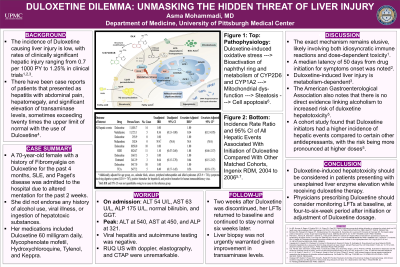Sunday Poster Session
Category: Liver
P1405 - Duloxetine Dilemma: Unmasking the Hidden Threat of Liver Injury
Sunday, October 27, 2024
3:30 PM - 7:00 PM ET
Location: Exhibit Hall E

Has Audio

Asma Mohammadi, MD
UPMC Mercy
Pittsburgh, PA
Presenting Author(s)
Asma Mohammadi, MD
UPMC Mercy, Pittsburgh, PA
Introduction: Duloxetine, a medication commonly used for fibromyalgia, has proven effective in managing a range of psychiatric and chronic pain issues. However, it's important to be aware of a potential concern in its use— the possibility of increased Alanine Transaminase (ALT) and Aspartate Transaminase (AST). This abstract emphasizes the need for regular monitoring of transaminases in patients taking duloxetine. Here, we present a case of elevated liver enzymes attributed to duloxetine therapy in a patient with fibromyalgia.
Case Description/Methods: A 70-year-old female with a medical history of fibromyalgia on Duloxetine, Systemic Lupus Erythematosus, and Paget’s disease admitted to the hospital for altered mentation was found to have elevated ALT 54 U/L, AST 63 U/L, normal bilirubin, and gamma glutamyl transferase. The mild elevation in Alkaline Phosphatase (ALP) 175 U/L was secondary to Paget's disease. She denied any history of alcohol use, viral illness, or ingestion of hepatotoxic substances. Her medications included Duloxetine 60 milligram daily, Mycophenolate mofetil, Hydroxychloroquine, Tylenol, and Keppra. Her ALT peaked at 540, AST at 450, and ALP at 321. Viral hepatitis serologies and autoimmune testing were negative. Right upper quadrant ultrasound with doppler of hepatic vessels, elastography, and CT abdomen pelvis were unremarkable. Two weeks after Duloxetine was discontinued, her Liver Function Tests (LFTs) returned to normal and continued to stay normal six weeks later. With resolution of her transaminases, liver biopsy was not urgently warranted.
Discussion: Duloxetine-induced hepatotoxicity, though rare, poses a potentially serious risk, manifesting in a spectrum of liver injury patterns from transaminitis to acute liver failure. The exact mechanism remains elusive, likely involving both idiosyncratic immune reactions and dose-dependent toxicity. In our case, the patient exhibited elevated liver enzymes post-initiation of duloxetine, resolving upon discontinuation. Diagnosis hinges on exclusion, necessitating thorough evaluation to rule out alternative causes of liver injury. Swift discontinuation of duloxetine coupled with vigilant liver function monitoring is imperative for managing suspected cases of drug-induced hepatotoxicity.
Disclosures:
Asma Mohammadi, MD. P1405 - Duloxetine Dilemma: Unmasking the Hidden Threat of Liver Injury, ACG 2024 Annual Scientific Meeting Abstracts. Philadelphia, PA: American College of Gastroenterology.
UPMC Mercy, Pittsburgh, PA
Introduction: Duloxetine, a medication commonly used for fibromyalgia, has proven effective in managing a range of psychiatric and chronic pain issues. However, it's important to be aware of a potential concern in its use— the possibility of increased Alanine Transaminase (ALT) and Aspartate Transaminase (AST). This abstract emphasizes the need for regular monitoring of transaminases in patients taking duloxetine. Here, we present a case of elevated liver enzymes attributed to duloxetine therapy in a patient with fibromyalgia.
Case Description/Methods: A 70-year-old female with a medical history of fibromyalgia on Duloxetine, Systemic Lupus Erythematosus, and Paget’s disease admitted to the hospital for altered mentation was found to have elevated ALT 54 U/L, AST 63 U/L, normal bilirubin, and gamma glutamyl transferase. The mild elevation in Alkaline Phosphatase (ALP) 175 U/L was secondary to Paget's disease. She denied any history of alcohol use, viral illness, or ingestion of hepatotoxic substances. Her medications included Duloxetine 60 milligram daily, Mycophenolate mofetil, Hydroxychloroquine, Tylenol, and Keppra. Her ALT peaked at 540, AST at 450, and ALP at 321. Viral hepatitis serologies and autoimmune testing were negative. Right upper quadrant ultrasound with doppler of hepatic vessels, elastography, and CT abdomen pelvis were unremarkable. Two weeks after Duloxetine was discontinued, her Liver Function Tests (LFTs) returned to normal and continued to stay normal six weeks later. With resolution of her transaminases, liver biopsy was not urgently warranted.
Discussion: Duloxetine-induced hepatotoxicity, though rare, poses a potentially serious risk, manifesting in a spectrum of liver injury patterns from transaminitis to acute liver failure. The exact mechanism remains elusive, likely involving both idiosyncratic immune reactions and dose-dependent toxicity. In our case, the patient exhibited elevated liver enzymes post-initiation of duloxetine, resolving upon discontinuation. Diagnosis hinges on exclusion, necessitating thorough evaluation to rule out alternative causes of liver injury. Swift discontinuation of duloxetine coupled with vigilant liver function monitoring is imperative for managing suspected cases of drug-induced hepatotoxicity.
Disclosures:
Asma Mohammadi indicated no relevant financial relationships.
Asma Mohammadi, MD. P1405 - Duloxetine Dilemma: Unmasking the Hidden Threat of Liver Injury, ACG 2024 Annual Scientific Meeting Abstracts. Philadelphia, PA: American College of Gastroenterology.
